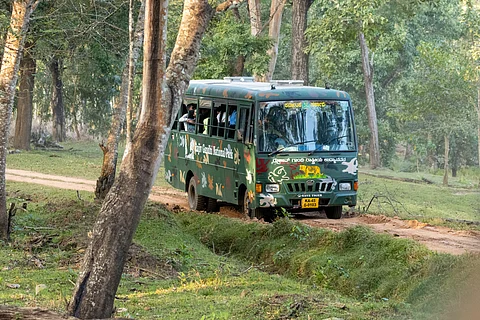

Dozens of Jenu Kuruba families have returned to ancestral forest lands in Nagarahole, sparking clashes with Karnataka’s forest department.
The group, classified as a Particularly Vulnerable Tribal Group (PVTG), will lead a two-day protest on August 9 with support from Adivasi collectives and civil society.
Protesters accuse forest authorities of eviction, intimidation, and wildlife tourism in areas from which they are being forcibly removed.
They demand recognition of forest rights under the Forest Rights Act and an end to surveillance, displacement, and ecological destruction for commercial gain.
Adivasi and Indigenous communities in Karnataka are set to launch a major protest against the forest department’s ongoing attempts to evict tribal families from the Nagarahole reserve. The move follows the return of 52 Jenu Kuruba families to their ancestral homes in Karadikallu Hattur Kollehaadi village, land they say is rightfully theirs under Indian law.
Classified as a Particularly Vulnerable Tribal Group, the Jenu Kuruba have deep-rooted spiritual and ecological ties to the forest, its wildlife and sylvan deities. They gather medicine, honey, fruits, vegetables, tubers and the thatch and bamboo needed to build their houses. The name of the tribe means “honey collector”.
The communities’ return was met with resistance from forest officials, leading to fresh conflict.
On August 9, indigenous groups under the banner of the Nagarahole Adivasi Jammapale Hakku Sthapana Samiti (NAJHSS), supported by civil society organisations and forest rights defenders, will march to the Nanachi Forest Gate to protest against what they describe as “systemic violations” of the Forest Rights Act (FRA) of 2006. August 9 commemorates the International Day of the World’s Indigenous Peoples every year.
In a joint statement issued by Survival International, an organisation campaigning for tribal rights globally, the group said the protest would focus on “the systemic violations of forest and habitat rights guaranteed under the FRA and the continuing violence on our lives, livelihoods and our bio- cultural lifeworld.”
Despite directives from the Union Ministry of Tribal Affairs, they say the state government and local administrations in Mysuru and Kodagu have failed to implement the FRA and recognise their habitat rights. “This refusal to act reflects a deliberate and systemic denial of our constitutional and legal rights under national and international laws and covenants,” the statement said.
Forest authorities, they alleged, continue to evict families and criminalise indigenous leaders who assert their legal claims. At the same time, wildlife tourism continues unabated in the same “inviolate” areas the Jenu Kuruba are being removed from.
“The tourism routes within Nagarahole are encroaching on our lands and are part of our community forests. This blatant contradiction exposes the commodification of the forest under the guise of conservation, while denying rightful claims over forests that our people have protected for generations,” the group said.
The militarisation of the forest has escalated tensions and distressed the local communities, as artificial intelligence-enabled surveillance cameras and paramilitary units are stationed across the reserve. Community leaders argue this amounts to intimidation.
Officials have blamed the evictions on rising human-animal conflict in Kodagu, but tribal leaders disagree.
The real threat comes from deforestation and commercial coffee plantations. The evictions are meant to distract from the real crisis, as Adivasi communities have long been protectors of nature and have lived in harmony with wildlife for generations
Barbed wire and electrified fencing around plantations have led to injuries and deaths among wild animals, further fragmenting habitats and intensifying ecological stress.
These plantations have severely fragmented wildlife habitats, and in several instances, the deadly solar and barbed-wire fences have injured or killed animals. Such incidents, they noted, have worsened human-wildlife conflict and added to the ecological stress in Nagarahole.
The NAJHSS has demanded recognition of their forest and habitat rights under the Forest Rights Act, along with an immediate halt to evictions, intimidation, and the criminalisation of indigenous communities.
They have also called for an end to the surveillance of communities, a halt to tourism, and a stop to the ecological destruction of forests for commercial coffee plantations.